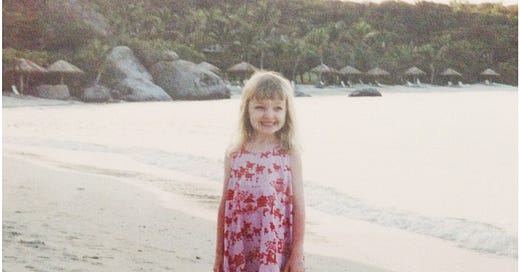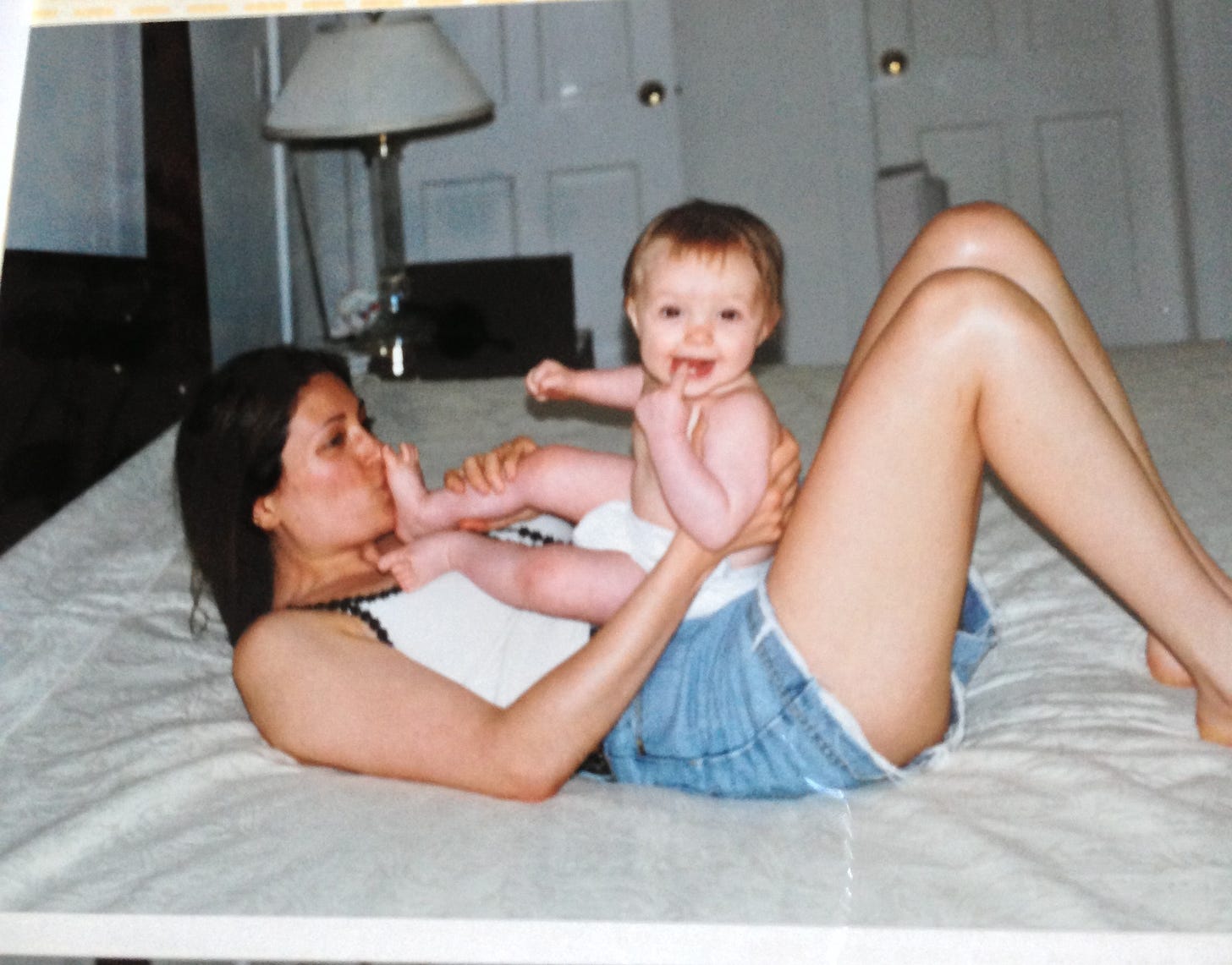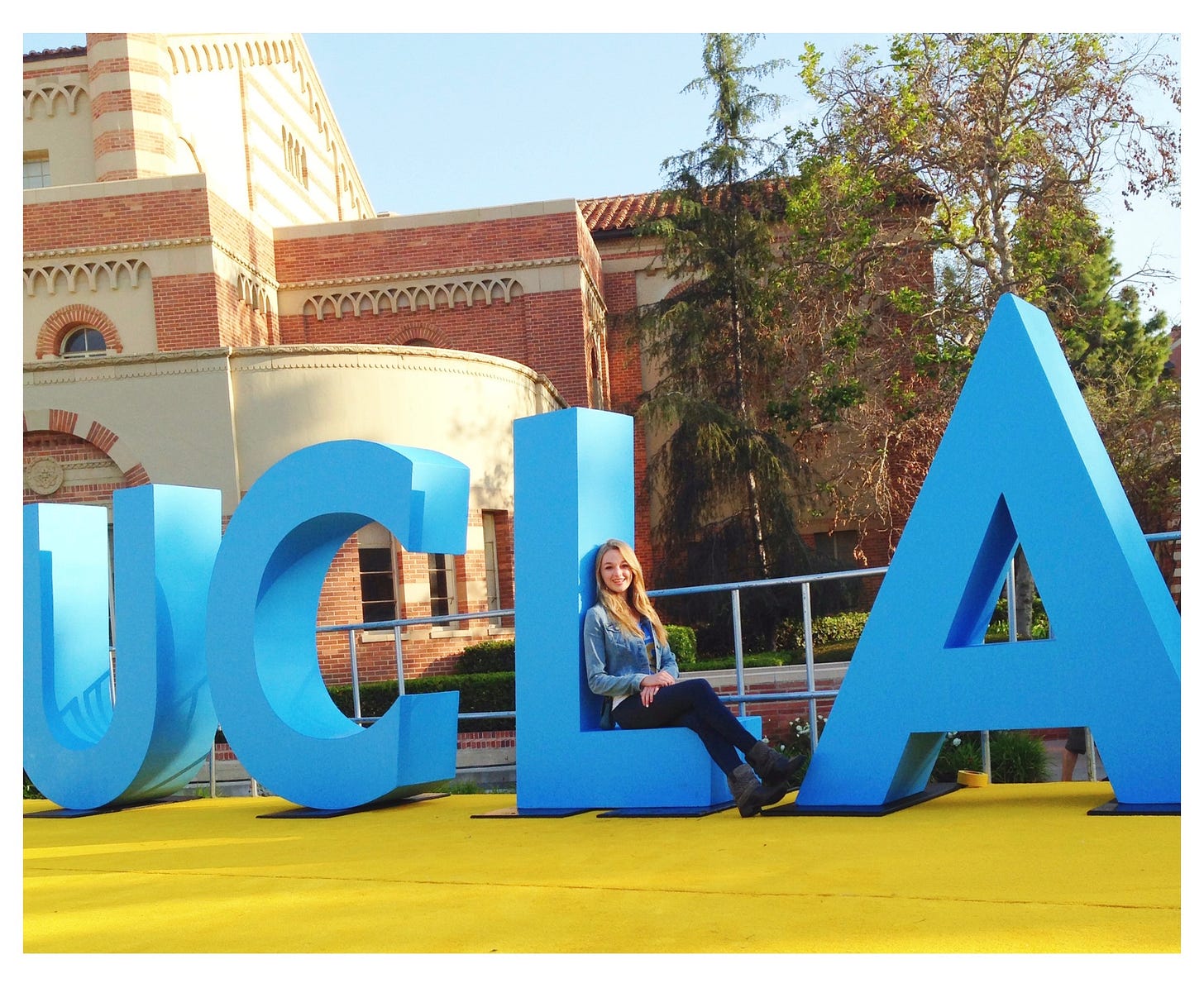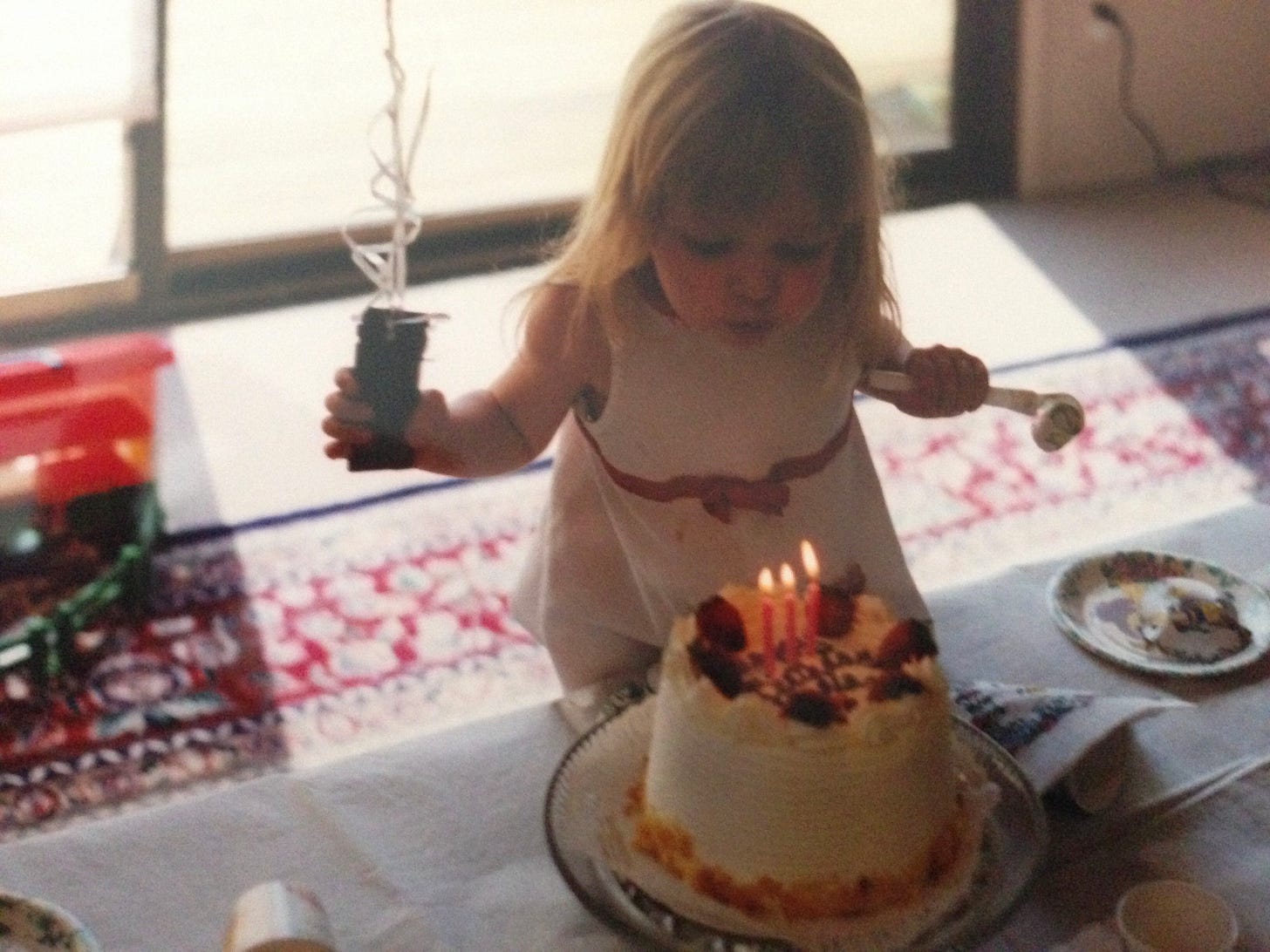I Have 50+ Half-Siblings & Counting
What being donor-conceived taught me about family, identity, & finding joy in the unexpected
If you’ve followed me for a while, you know a lot about my health journey, detox protocols, and low-tox recommendations. However, I’ve come to realize that the “healing journey” isn’t just about taking supplements and filtering your tap water… It’s also about sharing your story. Being open and vulnerable. Because when we speak honestly about what we’ve been through, someone out there who’s going through something similar might feel seen, comforted, and maybe even a little more whole.
Let’s start at the beginning.
When I was around 11, my mom sat me down and told me something that changed my life:
“Your dad… isn’t actually your biological father.”
At first, I thought she meant I was adopted. She laughed and said, “No, you came out of me!” But she explained that when she and her then-husband struggled to conceive, they turned to a cryobank. They selected a donor based on characteristics that matched her husband, so I wouldn’t grow up questioning my genetics.
But I did grow up with questions. My parents divorced when I was very young. I’d stay with my mom during the week, and visit “dad” on weekends. Eventually, my mom got full custody due to his volatile behavior.
So when she told me he wasn’t biologically my father, I cried—not from sadness, but from relief. I remember thinking, 'Maybe I won’t turn out like him.' Maybe I’m not bound to his behavior.
At eleven, that realization was a gift. However, I must note that I didn’t have the words for it then, but I understand now: we are not doomed by our genetics. Just because someone shares your DNA doesn’t mean you’re bound to repeat their patterns. Blood might connect us, but it doesn’t define who we become. Let’s keep going…
My mom mentioned something else: that the donor had a supposed limit of “10 offspring.” That number sounded both incredibly large and small. I was an only child—siblings weren’t part of my world.
But suddenly, the idea that I might have siblings out there? That was thrilling.
Not because I wanted to find “my dad.” In fact, I never cared about that. To me, a dad is the man who raises you, supports you, and loves you. The guy who donated? He was just part of the biology. And biology alone doesn’t make someone family.
So we signed up for the Donor Sibling Registry—a clunky, early-internet-era site where donor-conceived people could try to find half-siblings. I found a few profiles, but most were inactive or unresponsive.
Eventually, I moved on. I was a teenager. Life was busy.
Years later, I joined 23andMe out of curiosity (yes, the one that has leaked people’s info and went bankrupt… oops). Maybe this is how I’ll find some of my siblings! At first, nothing exciting happened—just hundreds of distant cousins like everyone gets. And it was like that for yeaaaars. Eventually, my excitement dissipated. I would habitually delete my “New DNA Relatives” emails from 23andMe the moment I saw them appear. Then one day, shortly after I graduated from UCLA, I received a message request.
A half-sister!!
She had two moms and knew she was donor-conceived since she was little. We were born two months apart, she was also raised an only child, and we looked so much alike. We hit it off instantly. I was uber excited!
We chatted a bit. We lived on different coasts, but agreed to meet up if one of us happened to travel near the other. And that was that… until…
It started happening.
A half-brother.
Then twin half-sisters.
Then another.
And another.
We were multiplying. Fast.
What happened? Well, I blame Black Friday deals. No, seriously. There was a year when 23andMe started advertising everywhere, and people were curious to find out where their ancestry was from geographically. The first half-brother I connected with did just that—he was not prepared to find half-siblings, let alone learn that his dad was not his biological father.
I quickly realized this wasn’t going to be a one-time surprise—it was going to be an ongoing phenomenon. So I created a private Facebook group for all the half-siblings who wanted to stay in touch. It was easier this way to connect with them, rather than introducing ourselves individually every time a new sibling would appear.
Some declined to join the FB group. Totally fair. But many joined. And the number kept growing.
Eventually, one of us got curious enough to hire a search angel—I didn’t even know what this was at the time, but basically, they’re a volunteer genealogist who helps people find biological family. With just our donor’s ID number and some basic info, she found him. It literally took her a day. No name, no photo, just the most basic info. I couldn’t believe it!
FYI: Some sperm donors choose to stay anonymous. Some allow you to contact them once you turn eighteen years old. My biological father chose anonymity. I genuinely don’t think he thought—over 30 years ago when he made the donation—that there would be a way for us all to find each other on the internet. Wild.
It turns out that he went to multiple schools—including UCLA, where I also attended. He became a doctor in hematology, and we believe he donated at multiple banks, which explains the overwhelming sibling count. Because, yeah, that wasn’t supposed to be the case… And I don’t think it was really regulated that well back then. Now? Well, I haven’t looked into it, but I certainly hope they limit it across the board because having more than 10 unknown half-siblings out there could be a setup for some possible weird things to happen.
Anyhow, he had opted for anonymity. We chose to respect that. None of us has reached out (to my knowledge). Some joked about showing up at his office, but at the end of the day, we agreed: he wasn’t our dad. He didn’t raise us. He doesn’t owe us anything.
Still, it was nice to know of his existence.
In some way, it felt like closing the book on that chapter—not out of resentment, but out of resolution.
Well, that wasn’t the end of the story! Surprise, surprise: some of our biological fathers’ siblings (our aunts + uncles) eventually joined 23andMe, completely unaware of what they were about to find. Suddenly, they were staring at pages of DNA matches labeled “niece” and “nephew.”
One of my half-sisters and I even had a Zoom call with a few of our biological cousins. They were kind, supportive, and just as curious as we were. We asked our questions, they asked theirs—and together, we pieced together a bit more of the puzzle.
So yes, daddy-o knows we exist. And now, we know who he is. We haven’t met, and maybe we never will—and honestly, that’s perfectly okay. We’ve already received more answers than we ever expected. And even if we hadn’t, I know I’d still be living my life just the same.
Even though many of us have never met in person, we share eerily similar traits: our laughter, the way we gesture, our introverted nature, and even the way we process emotions.
I also want to note that family is also about choice.
I’ve only gotten to know a few of my half-siblings. The first sister I connected with is now a friend of mine. And I’m grateful that another one of them has become one of my dearest friends. But overall, most of our connections are surface-level. And that’s okay. We didn’t grow up together. We don’t owe each other anything.
I wish I could share photos of all of us so you can see the resemblances, but I’m respecting everyone’s privacy. Just imagine a bunch of people who look like me but with really blonde hair (I dye mine red!).
How many siblings do you have?
Over 60, I think? Probably more. Think about it… We’ve found some of us on 23andMe, some on Ancestry… and then what about the people who have never done a DNA test?!
Do you want to meet the donor?
I respect his privacy. I’m genuinely happy, whether or not I meet him.
Do you think it’s wrong that there are so many of you?
Honestly? Yes and no. I believe we’re all here for a reason. However, I also think the system should have had more oversight. There should be limits, and clinics should communicate with each other to prevent donor overuse.
Did you like being an only child?
I actually loved it, though I do wonder what life would’ve been like had I had a sibling to share life experiences with. There’s no one else to share the weight of your parents’ dreams or disappointments. No buffer, no sibling to deflect or dilute. You often grow up fast. You become hyper-aware of how your choices affect your parent, especially if you’re close.
Do all donor-conceived people feel the way you do?
Not at all. Some of my half-siblings struggled with the revelation. Some felt lied to and were angry. If you’re a parent navigating this, here’s some advice: tell your child early. Normalize it. Celebrate it. Let them grow up with the truth. They learn that the people who love and raise them = family, not some sperm donor who had no part in their lives. It’s harder to digest new information like this as a teenager or adult.
Please know this: you were wanted!
Your parents went through a process—often expensive, emotional, and exhausting—to bring you into this world. You were not an accident. You were chosen.
And you are not alone.
There are support groups, Facebook communities, and incredible people who truly understand. Talk to other donor-conceived people. Talk to your siblings, if you’ve found them.
We’re living in a time where secrets don’t stay secret for long. With tools like 23andMe and Ancestry, the truth often emerges—sometimes decades later.
But maybe that’s not a bad thing.
Perhaps these stories, as messy, strange, or overwhelming as they may be, are the key to healing old wounds, rewriting old narratives, and discovering unexpected joy.
So yes—I have a lot of half-siblings.
But more importantly?
I have clarity.
I have compassion.
And I have a really, really great party story.
P.S. If you’ve had a DNA surprise or donor-conceived story of your own, I’d love to hear it. Let’s normalize these conversations. Let’s keep rewriting what family can mean. 💛





















Relatable